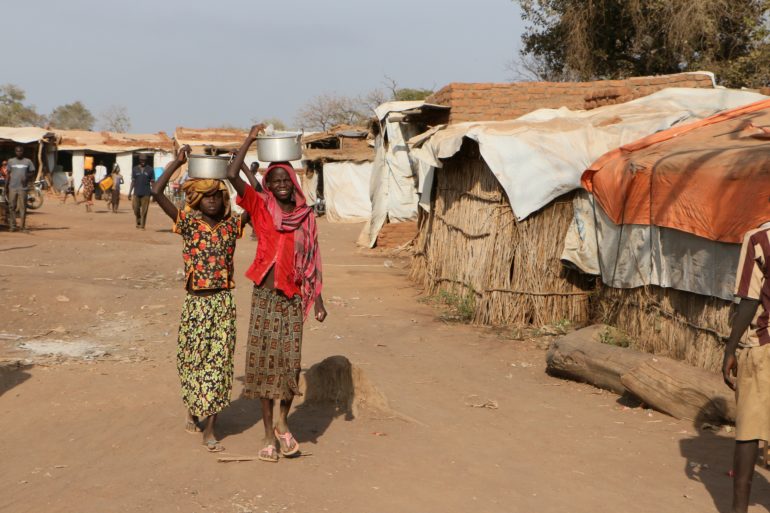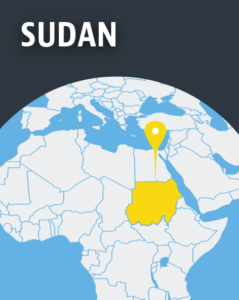
The US has announced it will lift economic sanctions on Sudan “in recognition of [its] positive actions” in fighting terrorism, expanding humanitarian access and reinforcing a cease-fire in conflict areas, but rights groups say the decision is premature as there has been little progress on human rights.
The decision, which will take effect on 12 October, has “disappointed” the chairman of the US Commission on International Religious Freedom, Daniel Mark.
“The State Department must now redouble its efforts to engage the government of Sudan on pressing for greater religious freedom and better overall human rights,” he said.
Andrea Prasow, deputy director of the Washington office of Human Rights Watch, told Reuters that “it sends the wrong message to lift these sanctions permanently when Sudan has made so little progress on human rights”.
Sudan’s
Despite its decision to lift the sanctions, the US government said it recognises “much more progress is needed … including further expanding humanitarian access, improving the Government of Sudan’s human rights and religious freedom practices, and ensuring that the Government of Sudan is committed to the full implementation of UN Security Council resolutions on North Korea”.
According to a UN report earlier this year, in 2013 Sudan supplied North Korea with sophisticated air-to-ground missiles that use satellite guidance systems. For that reason Sudan will remain on the US’s list of State Sponsors of Terrorism, together with Syria and Iran. Some sanctions will also remain in place, such as the arms embargo, freezing of funds and blocking of property against those who were involved in committing human rights abuses in Darfur.
Meanwhile, the UN Human Rights Council seemed to signal that in a year’s time it will terminate the mandate of the UN Independent Expert on Human Rights in Sudan, referring to a “period of transition”. Advocacy group Christian Solidarity Worldwide said it was concerned the move was “perhaps influenced by the eagerness of some States to cooperate with Sudan on migration and counter-terrorism”.
Background
As World Watch Monitor reported in January, one of Barack Obama’s last acts in office was to scale back a 20-year-old trade embargo on Sudan, giving the government in Khartoum 180 days to show itself ready for sanctions to be lifted.
On 12 July the US government extended the sanctions for another three months, saying it needed more time to review whether Sudan had done enough to merit their removal, especially “in the areas of achieving sustainable peace in Sudan, removing remaining obstructions to the delivery of humanitarian assistance, bolstering cooperation to counter terrorism and promote regional stability”.
Prior to that delay, several groups petitioned the US government not to lift the sanctions. A bipartisan group including 53 US lawmakers wrote to President Trump mentioning the “demolition of two Christian churches in Khartoum this year” and the Sudan government’s plan to bulldoze at least 27 more, describing it as “state-sanctioned persecution of Christians and the denial of freedom of religion”. On 2 August another church that was on the list to be demolished, a Baptist church in Omdurman, was destroyed by the Sudanese government.
The petition echoed the appeal of seven US-based organisations in June to US Secretary of State Rex Tillerson, asking him to take into account the situation of ethnic and religious minorities in Sudan.
USCIRF also wrote to Tillerson, urging him to maintain the sanctions, saying “Sudan has not ‘sustained positive actions’ with regard to religious freedom.” USCIRF also criticised the sanction review policy for not requiring an evaluation of progress, or lack thereof, on human rights or religious freedom.
Sudan is No. 5 on the Open Doors 2017 World Watch List of the 50 countries in which it is most difficult to be a Christian, and is also a “country of particular concern” for USCIRF.
In a recent interview with World Watch Monitor, Sudanese Christian Mariam Ibrahim talked about her experiences of narrowly escaping being hanged for “apostasy”, first having been lashed 100 times for “adultery”.
World Watch Monitor has reported on the destruction of several churches in and around Khartoum, and the situation of the people of the Nuba Mountains, who have been the subject of “ethnic cleansing”, according to Christian charity Open Doors.
Churches have also been pressured by the Sudanese government to hand over their property and several pastors have faced trial for alleged actions against the state, including espionage and attempting to defame the government.
In response to concerns raised over its human rights record by the US embassy in Khartoum in July, Sudan insisted that the country “enjoys religious freedom” and “unprecedented openness”.
‘Fundamentally immoral’
The news that the Sudanese government had hired a prominent Washington-based law and lobbying firm, Squire Patton Boggs, for $40,000 a month, to help it make a case for the removal of sanctions, was called “fundamentally immoral” by former US Representative Frank Wolf.
“The very fact that one of the major law firms in this city would represent a genocidal government … makes me sick,” he told WNG-reporter J.C. Derrick in July.
Sudan’s Minister for Trade, Hatim Al Sir, said the lifting of sanctions will help boost Sudan’s trade with the US and its inclusion in the international financial and trade system. Already Sudan’s national carrier, Sudan Airways, has started looking at procuring new components from Boeing and Airbus.
Meanwhile, Mindy Belz asked the question of who else might profit from the lifting of sanctions.
“Given the extensive lobbying effort by Khartoum, it’s worth asking who stands to gain,” she wrote. “ExxonMobil? When Secretary of State Rex Tillerson was its CEO, Exxon did deals with Sudan despite sanctions, according to an SEC report. The oil giant also has renewed an oil deal with South Sudan, which requires transit through Sudan to Red Sea ports. Trump’s recently announced new travel order removed Sudan from the list of banned countries, while it added Chad, a move opposed by US military leaders and diplomats. Chad attempted to fine Exxon $74 billion over unpaid royalty payments while Tillerson was its head.”
She also noted that the World Health Organization seemed to be backing the Sudanese government in its denial of the massive cholera epidemic.